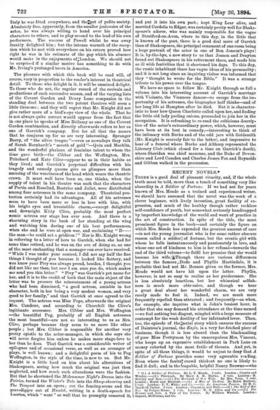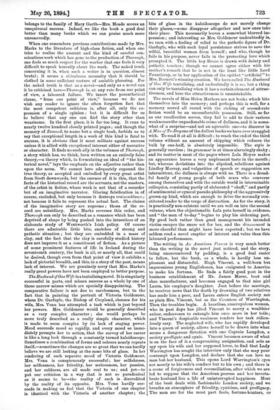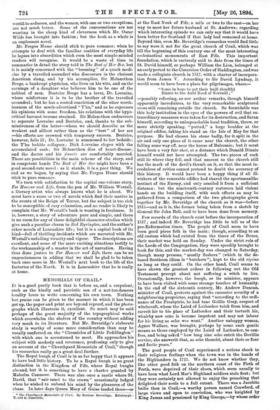RECENT NOVELS.* THERE is a good deal of pleasant vivacity,
and, if the whole truth must be told, more than a touch of something very like absurdity in A Soldier of Fortune. If we had not for years known of Mrs. Meade as a trained and experienced writer, we should have assumed that the novel was the work of a clever beginner, with lively invention, great facility of ex- pression, and much of the healthy though rather reckless self-confidence of youth, but somewhat seriously handicapped by imperfect knowledge of the world and want of practice in the art of construction. In spite of the title, the most prominent figure in the book—and certainly the figure on which Mrs. Meade has expended the greatest amount of care —is not the young journalist who is for some rather obscure reason called a soldier] of fortune, but the erratic girl with whom he falls instantaneously and passionately in love, and whose one act of kindness to him is her refusal—towards the end of the third volume—to fulfil her promise that she would become his wife.2Though there are various differences between the famous ,iDodo and Phyllis Martindale, it is probable that had not Mr. Benson given us the former, Mrs. Meade would not have hit upon the latter. Phyllis, however, is not so easy to realise as her predecessor. She is less absolutely heartless, but her whimsical selfish- ness is mach more obtrusive, and though we hear a great deal about her wonderful charm, we are very rarely made to feel it. Indeed, we are much more frequently repelled than attracted ; and frequently—as when, for example, she inquires what is John's busiest hour, in order that she may demand his attendance at the time named —we feel nothing but disgust, mingled with a large measure of contempt for the weak docility of her infatuated lover. Then, too, the episode of the];serial story which ensures the success of Daintree's journal, the Eagle, is a very far-fetched piece of business, though it is less absurd than the blackmailing of poor Miss Prettyman by the unscrupulous Mrs. Vincent, who keeps up an expensive establishment in Park Lane on money extorted by the most futile of threats. And yet, in spite of all these things, it would be unjust to deny that A Soldier of Fortune provides some very agreeable reading. Even where the faults; crowd thickest no one is likely to find it dull; and in thelcapable, helpful Nancy Browne—who
* (1.) A Soldier of Fortune. By L. T. Meade. 3 vols. London Chatto and Windns.—(2.) Thorough. By Mary A. M. Marks. 3 vols. London : R. Bentley and Son.—(3 g The Ha‘band of Clos Wife. By Mrs. Venn. 3 vols. London : Hurst and Blackett.—(4 ) A Man of To-Day. By Helen Mathers. 3 vols. London: F. V. White and Co.—(5) An American Peeress. By H. O. Chatfield-Taylor. 2 vols. London Chapman and Hall.—(6 ) The Beet of Her fty Fergus Hume. 2 vols. London W. H. Allen and Co —(7.) For Honour and Life. A Tale of the Parer. By William Westall. London Osgood, Mollvaiue, and Co.
belongs to the family of Mary Garth—Mrs. Meade scores an unequivocal success. Indeed, we like the book a good deal better than many books which we can praise much more unreservedly.
When one remembers previous contributions made by Mrs. Marks to the literature of high-class fiction, and when one tries to realise the amount and the kind of careful con- scientious work which has gone to the production of Thorough, one feels so much respect for the worker that one feels it very difficult to speak honestly about the work. The naked truth concerning it is, when such a writer is in question, almost brutal; it seems a chivalrous necessity that it should be clothed in some sufficient vesture of amiable phrasing. For the naked truth is that as a novel—and only as a novel can it be criticised here—Thorough is, at any rate from our point of view, a laboured failure. We insert the• parenthetical clause, "from our point of view," because we do not wish any reader to ignore the often forgotten fact that the most competent criticism is, after all, only the ex- pression of a single opinion ; but it is difficult for us to believe that any one can find the story other than wearisome. In the first place, it is far too long. It runs to nearly twelve hundred closely printed pages ; and though the memory of Esmond, to name but a single book, forbids us to say that exceptional length in a work of this kind is fatal to success, it is obvious that it must militate against success unless it is allied with exceptional interest either of narrative or character. It finds no such ally in the volumes of Thorough, a story which has, we think, been written on an entirely false theory,—a theory which, in formulating an ideal of "the his- torical novel," lays the emphasis on the adjective rather than upon the noun. We cannot here adequately expound the true theory, as accepted and embodied by every great artist from Scott downwards, but the essence of it is this, that the facts of the historical record are the servants, not the masters, of the artist in fiction, whose work is not that of a recorder but of an imaginative narrator. Glaring falsification is, of course, excluded, but only because it destroys vraisemblance ; not because it fails to represent the actual fact. The claims of the imaginative story are supreme ; those of the re- cord are subsidiary. Mrs. Marks reverses this order, and Thorough can only be described as a romance which has been deprived of shape by being pushed into the interstices of an elaborate study of Wentworth's Irish policy. Of course there are admirable little bits, snatches of strong and pathetic situation ; but they are embedded in a mass of clay, and the fact that the clay is carefully studied history does not improve it as a constituent of fiction. As a picture of some prominent features of life in Ireland during the seventeenth century, the book is all, or nearly all, that could be desired, though even from that point of view it exhibits a lack of pictorial breadth, and this, in a story of the past, means lack of interest. We are genuinely sorry that Mrs. Marks's really great powers have not been employed to better purpose.
The Husb and of One Wife is a tantalising novel. It is singularly successful in parts, and misses success as a whole by one of those narrow misses which are specially disappointing. The comparative failure is not due to carelessness, but to the fact that in painting the portrait of Victoria Goldenour, whom Dr. Garfoyle, the Bishop of Croyland, chooses for his wife, Mrs. Venn has attempted a task which is just beyond her powers. Mrs. Goldenour would be generally described as a very complex character ; she would perhaps be more truly described as a really simple character, which is made to seem complex by its lack of staying power. Mood succeeds mood so rapidly, and every mood so imme- diately prompts her to action, that the survey of her career is like a long look through a constantly turned kaleidoscope. Sometimes a combination of forms and colours nearly repeats itself,—sometimes the changes are so great that we can hardly believe we are still looking at the same bits of glass. In her rendering of each separate mood of Victoria Goldenour, Mrs. Venn is conspicuously successful ; her selfishness, her selflessness, her frivolity, her seriousness, her passion, and her coldness, are all made real to us ; and yet—to put our criticism in a way that is not so paradoxical as it seems to be—the reality of each is discredited by the reality of its opposite. Mrs. Venn hardly suc- ceeds in making us feel that the Victoria of one chapter is identical with the Victoria of another chapter; the bits of glass in the kaleidoscope do not merely change their places,—some disappear altogether and new ones take their place. This necessarily leaves a somewhat blurred im- pression; and interesting as Mrs. Goldenour undoubtedly is, we turn with a feeling of relief to the pathetic figure of Dr. Garfoyle, who with such loyal persistence strives to save the wilful, beautiful woman from herself ; and who, though he fails in his purpose, never fails in the protecting love which prompted it. The little boy Bruce is drawn with dainty and pathetic touches ; though we cannot agree either with his mother's remark that he is net in the least like little Lord Fauntleroy, or in her application of the epithet "artificial" to Mrs. Burnett's winning creation. We have called The Husband' of One Wife tantalising, and undoubtedly it is so; but a thing can only betantalising when it has a certain element of attrac- tiveness, and here the attractiveness is unmistakable.
The novels of Miss Helen Mathers are not books which bite themselves into the memory; and perhaps this is well, for a memory scored all round with the etching of second-rate fiction would be an uncomfortable possession. Still, so far as our recollection serves, they fail to add to their various weaknesses the unpardonable crime of dullness, and it is some- what of a surprise—and not an agreeable one—to discover in A Man of To-Day one of the dullest books we have ever struggled with. To read it at all is difficult; to reach the end of the third volume without an amount of skipping which reduces the bulk by one-half, is absolutely impossible. The style is generally careless ; its grammar is at times alarmingly shaky;. and its matter in most of the pages where Lela Hoyos makes an appearance leaves a very unpleasant taste in the mouth ; but, whereas deviations into the slipshod, rebellions against Lindley Murray, and vulgarities of speech or suggestion are intermittent, the dullness is always with us. There is a dread- ful family of young people of both sexes who converse- among themselves and with the outside world in interminable colloquies, consisting partly of elaborated "chaff," and partly of sentimental or cynical pseudo-philosophy of the aggressively grown-up kind, which are enough to drive the normally con- stituted reader to the verge of distraction. As for the story, it is practically non-existent until we are well on into the second volume, when the objectionable Lela puts herself in evidence,. and "the man of to-day" begins to play his sickening part. By good luck rather than good management his intended victim escapes the snare set for her, and the denouement is more cheerful than might have been expected; but we have seldom read a novel emptier of interest and value than this laboured performance.
The writing in An American Peeress is very much better than the writing in the novel just noticed, and the story, being unencumbered by padding, is a good deal easier to follow, but the book, as a whole, is hardly less nn- pleasant and distasteful. Hugh Vincent, a well-born but impecunious young Englishman, has emigrated to America to make his fortune. He finds a fairly good post in the business establishment of Mr. James Morse, boot and shoe manufacturer, and becomes engaged to that nice girl Laura, his employer's daughter. Just before the marriage, he receives news that the death by drowning of two relatives. has made him a peer, and Laura enters English society not as plain Mrs. Vincent, but as the Countess of Warrington. Then the troubles begin. A heartless, unscrupulous woman, who in past days has jilted Vincent to marry a wealthier suitor, endeavours to entangle him once more in her toils ; and Vincent's despicable weakness renders her task ridicu- lously easy. The neglected wife, who has rapidly developed into a queen of society, allows herself to be drawn into what seems a dangerous flirtation with one Captain Langdon, a society profligate and cynic. Vincent becomes aware of what is on the face of it a compromising assignation, and acts as spy upon his wife and her supposed lover, to find that Lady Warrington has sought the interview only that she may pour contempt upon Langdon, and declare that she can love no man but her husband. This opens Lord Warrington's eyes not merely to his wife's conduct but to his own ; and there is a scene of forgiveness and reconciliation, after which we are led to suppose that the American peeress and her inverte- brate husband live a life of uninterrupted happiness. Most of the book deals with fashionable London society, and we breathe an atmosphere of frivolity, cynicism, and profligacy. The men are for the most part fools, fortune-hunters, or
would-be seducers, and the women, with one or two exceptions, are not much better. Some of the conversations are not wanting in the cheap kind of cleverness which Mr. Oscar Wilde has brought into fashion; but the book as a whole is an unpleasant novel.
Mr. Fergus Hume should stick to pare romance; when he attempts to deal with the familiar realities of everyday life he lapses into absurdities which even the most simple-minded readers will recognise. It would be a waste of time to summarise in detail the story told in The Best of Her Sex, but it is mainly concerned with the "booming" of a quack medi- cine by a travelled scoundrel who discourses in the choicest American slang, and by his accomplice, Sir Melancthon Brege, a bankrupt physician, who lives on his wits, and on the earnings of a daughter who believes him to be one of the noblest of men. Beatrice Brege has a lover, Dr. Lorraine, whose misfortune it is to be the brother of the travelled scoundrel; but he has a rooted conviction of the utter worth- lessness of the much-advertised " T'ho," and as he expresses his opinions with some freedom, his relations with the hypo- critical baronet become strained. Sir Melancthon endeavours to separate Lorraine and Beatrice, and, thanks to the sub- missiveness of the latter—whom we should describe as the weakest and silliest rather than as the " best " of her sex —his efforts are crowned with temporary success. Beatrice, however, falls ill; Dr. Lorraine is summoned to her bedside; the T'ho bubble collapses ; Dick Lorraine elopes with the accumulated cash ; Sir Melancthon dies of heart-disease; and the doctor and his fiancée are comfortably married. There are possibilities in the main scheme of the story, and in competent hands The Best of Her Sex might have been a good second-rate novel : as it stands, it is a poor thing. We end as we began, by saying that Mr. Fergus Hume should stick to pure romance.
We turn with satisfaction to the capital one-volume story, .For Honour and Life, from the pen of Mr. William Westall, a literary artist who always knows what he is about. We must have a score or two of novels which find their motive in he events of the Reign of Terror, but the subject is too rich to be susceptible of easy exhaustion, and no reader is likely to complain that Mr. Westall's book is wanting in freshness. It is, however, a story of adventure pure and simple, and there is no room for any of those delightful character-studies which give such a peculiar charm to Bed Byvington, and the author's ether novels of Lancashire life ; but it is a capital book of its kind—full of thrilling incidents which are narrated with Mr. Westall's unfailing vivacity and vigour. The descriptions are excellent, and some of the more exciting situations testify to the workmanship of a master in the art of narration. Having thus done justice to For Honour and Life, there can be no ungraciousness in adding that we shall be glad to be taken back once more in Mr. Westall's next book to the life of the factories of the North. It is in Lancashire that he is really at home.




































 Previous page
Previous page